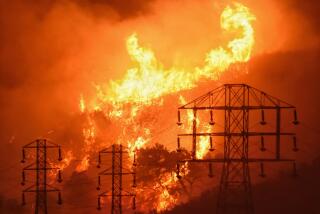Officials Say L.A. Safe From Electricity Crisis Rate Hikes
As the rest of the state reeled from a man-made energy crisis, Los Angeles Mayor Richard Riordan and Department of Water and Power chief David Freeman assured city residents Friday that they are safe from the current troubles and would not face the rate hikes afflicting consumers across the state.
“Today we declare war against any price increase for energy in the city of Los Angeles,” Riordan announced at the DWP’s Valley station. “We have not increased rates for eight years, and they are going to remain stable as long as we keep working together to use our energy wisely.”
Los Angeles’ immunity from the recent energy crisis has been a boon for the city in many respects. Customers here are not faced with the threat of soaring rates, and the DWP, for years shadowed with crippling debts, is selling energy to other areas and, in the process, speeding up its campaign to become debt-free by 2003.
At the same time, however, the department is on record as promising to lower rates by 2002, a pledge rising natural gas prices have made harder to fulfill. Although that promise was not discussed Friday, Freeman in a recent interview said he still intends to meet it.
Indeed, so successful has Los Angeles been in holding rates down that it now has turned the energy crisis into a city sales pitch. The L.A. Business Team’s latest advertisements in nationwide magazines brag that the city has, among other things, “7,000 megawatts of reliable, competitively priced power.”
‘Czar of Energy’ Praised by Mayor
Riordan attributed the city’s edge to the “czar of energy,” Freeman, who counseled against selling off the DWP and who broke with many energy experts in 1997 over the proper way to prepare for the approaching deregulation of the state’s electricity market.
California’s 1996 deregulation law lifted caps on wholesale energy prices. The state Public Utilities Commission then forced investor-owned utilities to sell their non-nuclear power plants in the state, and the companies started buying power from competing generators.
The deregulation was intended to increase competition among generators and drive down wholesale prices, but those wholesale prices instead have skyrocketed.
The result has thrown the electricity situation into chaos, but has become a source of barely concealed glee among Los Angeles leaders.
“While other utilities were attending seminars on deregulation, our people were hard at work bringing almost 1,000 megawatts of power capacity back on line,” said Freeman, sporting his trademark cream-colored cowboy hat.
Also in attendance Friday was former Councilman and now state Sen. Richard Alarcon (D-Los Angeles), who said the city is an example to the rest of the state.
A news release from the mayor’s office says the average DWP customer pays $52.17 a month for electricity. Under newly approved rate hikes, a Southern California Edison customer will pay $64.62 for the same electricity and a Pacific Gas & Electric customer will pay $62.04
“DWP and some of the other municipal power providers are the model the state should look to,” said Alarcon, who is on the Senate’s energy committee. He added that the DWP should expand to serve other areas and that the city should continue to invest in solar energy.
The news conference was held at the base of the DWP’s towering Valley station. As the city’s emergency energy generating site, it was chosen to showcase Los Angeles’ stable power base. In December, while the city experienced record winter peak energy demands, the DWP had enough surplus power for 1.2 million homes.
Despite the symbolic setting, Riordan said residents should be frugal with their electricity. He underscored this by inviting 20 students from Sylmar Elementary School to learn about conservation.
Lined up wearing DWP T-shirts in front of the podium, the kids shouted on cue “Turn off the lights when you leave the room!” The mayor also reminded residents to close windows in the winter, turn off the heat when not at home, turn down the heat at night, turn off appliances when not in use and sign up for Green Power, a DWP program that allows residents to tack on a small addition to their utility bills in return for benefits and the promise that the money will be invested in renewable energy sources.
“Even though we haven’t had a crisis on our own hands, we need to do our part to keep costs low in the city of Los Angeles,” Riordan said. “Each of us can make a difference.”
More to Read
Get the L.A. Times Politics newsletter
Deeply reported insights into legislation, politics and policy from Sacramento, Washington and beyond. In your inbox three times per week.
You may occasionally receive promotional content from the Los Angeles Times.










